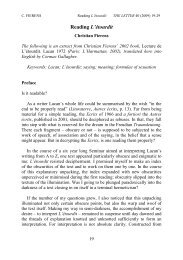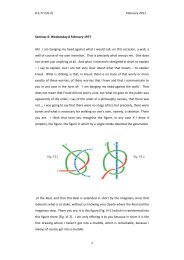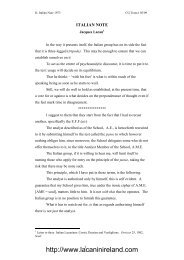time, it is from the po<strong>in</strong>t of view of the subject that I have a perspective of alack <strong>in</strong> the Other.So then what is this lack?How map it out with respect to transference love? Well then, when welisten to music that moves us, the first impression is hear<strong>in</strong>g all the time thatthis music has always someth<strong>in</strong>g to do with love; one might say that musics<strong>in</strong>gs with love. But if one takes this little schema seriously and if even onetries to comprehend how love functions, from this movement of torsion <strong>in</strong>music, you will sense it is not so much the subject, the subject who speaksof his love for the Other, but much more rather that he answers the Other,that his message is this answer where he is assigned by this subjectsupposed to hear and that his music of impossible love is <strong>in</strong> fact an answerthat he makes to the Other and that it is to the Other that he supposes thefact of lov<strong>in</strong>g him and of lov<strong>in</strong>g him with an impossible love. The problem,if you wish, one could <strong>in</strong> a summary way draw a parallel with certa<strong>in</strong>mystical positions, where the mystic is the one who does not tell you that heloves the Other, but that he only answers the Other who loves him, that he isput <strong>in</strong>to this position, that he has no choice, that he only answers it.In this second moment of the music, one can draw this parallel <strong>in</strong> themeasure that the subject effectively solicits the love of the Other for him,but the love of the Other qua radically impossible. That is why I put thisarrow, the fact is that the subject has, through this second po<strong>in</strong>t of view, hasa perspective on the lack that <strong>in</strong>habits the Other, namely, that as you see,after these two moments, one could say that there is confirmed by thissecond moment that the evaporated object, <strong>in</strong> the second position, rema<strong>in</strong>sjust as evaporated as <strong>in</strong> the first position. We are gett<strong>in</strong>g closer, as you see,we are gett<strong>in</strong>g closer to the end of the loop. Transference, one may remark,corresponds very precisely to the way <strong>in</strong> which <strong>Lacan</strong> <strong>in</strong>troducedtransference love <strong>in</strong> the sem<strong>in</strong>ar on Transference, namely, that there is there:the subject postulates that it is the Other who loves him; he poses therefore abeloved and a lover. There is therefore a passage, <strong>in</strong> this transference love,36
from the beloved to the lover. What I have told you there, <strong>in</strong> any case is notcorrect, because the second moment cannot be articulated as such, it issynchronically articulated with a third moment which exists, I would say,synchronically with it <strong>in</strong> the follow<strong>in</strong>g way: the subject, this time, if youwish, be<strong>in</strong>g himself a musician, be<strong>in</strong>g therefore a producer of the music,addresses himself to a new other, which I called the subject supposed tohear who is no longer altogether the Other at the start<strong>in</strong>g po<strong>in</strong>t, it is a newother. This new other, precisely, is no longer the ‘vel’ it is no longer ‘eitherone or the other’. To this new other, he is also go<strong>in</strong>g to identify himself,namely, that there is start<strong>in</strong>g from the top of the loop, a double arrangementwhere the subject is both the one who is speak<strong>in</strong>g and the one who ishear<strong>in</strong>g.Someth<strong>in</strong>g may perhaps illustrate this division for you: this is what ishighlighted, <strong>in</strong> my op<strong>in</strong>ion, by the myth of Ulysses and the Sirens. Youknow that Ulysses, <strong>in</strong> order to hear the song of the Sirens, had stuffed withwax the ears of his sailors. How ought we understand that? Ulyssesexposes himself to hear<strong>in</strong>g, to hear<strong>in</strong>g the <strong>in</strong>vocatory drive, <strong>in</strong> fact tohear<strong>in</strong>g the song of the Sirens; but what he is exposed to, s<strong>in</strong>ce, when hehears the song of the Sirens, you know that history tells us that he shouts tothe sailors, that he says to them: ‘Stop, let us stay here’. But he has takenhis precautions: he knows that he will not be heard. Namely, that this myth<strong>in</strong> my op<strong>in</strong>ion illustrates, this is my second moment, namely, that Ulysses isput <strong>in</strong> the position of be<strong>in</strong>g able to hear <strong>in</strong> the measure that he had assuredhimself that he could not speak, namely when he had assured himself thatthere would not be this reversal of the drive, namely, the second and thethird moments, namely, when he had assured himself that there would notbe a subject supposed to hear, because of these wax stoppers. You see thatthe first moment, ‘to hear’ is one th<strong>in</strong>g, but that even poses for us theproblem of the ethics of the analyst. Is the analyst precisely not someonefrom whom one can hear that he hears certa<strong>in</strong> th<strong>in</strong>gs, is he not, at a givenmoment, necessarily, by the very structure of the <strong>in</strong>st<strong>in</strong>ctual circuit, <strong>in</strong> aposition of hav<strong>in</strong>g to make himself a speaker? Not to behave like Ulysses,let us say, who had already taken a first risk of hear<strong>in</strong>g certa<strong>in</strong> th<strong>in</strong>gs.37
- Page 1: Seminar 1: Wednesday 16 November 19
- Page 5 and 6: after all noticed that to consist m
- Page 7 and 8: It would be enough for you to take
- Page 9 and 10: There had therefore been a turning
- Page 11: Supposing that we have a torus in a
- Page 15 and 16: topology encourages us to do so. Th
- Page 17 and 18: and me, and I who, in short, by din
- Page 19 and 20: we cut it in two, the front and the
- Page 21 and 22: is itself a hole and in a certain w
- Page 23 and 24: Everyone knows that this is how thi
- Page 25 and 26: Seminar 3: Wednesday 21 December 19
- Page 27 and 28: proceed to this double cut, a doubl
- Page 29 and 30: The inside and the outside in this
- Page 31 and 32: egards the structure of the body, o
- Page 33 and 34: inspired by it and its inspiration,
- Page 35: music on you, is that it has this p
- Page 39 and 40: that the little o-object is not uni
- Page 41 and 42: Seminar 4: Wednesday 11 January 197
- Page 43 and 44: short I called the discourses; the
- Page 45 and 46: It is flattened out, and in a way t
- Page 47 and 48: astonishes me still more, is not th
- Page 49 and 50: Seminar 5: Wednesday 18 January 197
- Page 51 and 52: see it here, namely, something that
- Page 53 and 54: namely, that everything that concer
- Page 55 and 56: Let’s see. Let us try to see here
- Page 57 and 58: - X: You can’t hear me because pr
- Page 59 and 60: Seminar 6: Wednesday 8 February 197
- Page 61 and 62: its relationship to the body that w
- Page 63 and 64: that in the position B1, would be t
- Page 65 and 66: is in the position of maintaining t
- Page 67 and 68: Effectively the problem of primary
- Page 69 and 70: which I will return later, what is
- Page 71 and 72: the object of desire is not unknown
- Page 73 and 74: that he tells the truth. You see th
- Page 75 and 76: look of the Real, there is not, for
- Page 77 and 78: accentuated by him is the search fo
- Page 79 and 80: What is happening, is it not, the d
- Page 81: grounded and articulatable way, and
- Page 84 and 85: eason is said to be purloined, whil
- Page 86 and 87:
Borromean knot with that of the Ima
- Page 88 and 89:
Alain Didier Weill, for his part, i
- Page 90 and 91:
Seminar 8: Wednesday 8 March 1977Wh
- Page 92 and 93:
shouldn’t tell you, at 7.15 at Ju
- Page 94 and 95:
means that the tongue fails, that,
- Page 96 and 97:
of his time as a formidable cleric
- Page 98 and 99:
It is very difficult not to waver o
- Page 100 and 101:
I remind you that the place of semb
- Page 102 and 103:
this term in the feminine, since th
- Page 104 and 105:
which coincides with my experience,
- Page 106 and 107:
and to put that for you in black an
- Page 108 and 109:
see, does not see too great an inco
- Page 110 and 111:
that exists, he says what he believ
- Page 112 and 113:
In short, one must all the same rai
- Page 114 and 115:
particular besides, neurotic, a sex
- Page 116 and 117:
functioning as something else. And
- Page 118 and 119:
mean to deny? What can one deny? Th
- Page 120 and 121:
slipping from word to word, and thi
- Page 122 and 123:
Seminar 12: 17 May 1977People in th
- Page 124 and 125:
y writing. And writing only produce
- Page 126 and 127:
not pinpointed it? He calls this a














